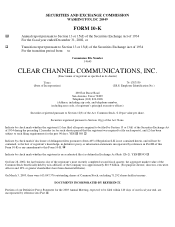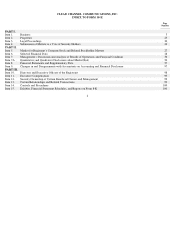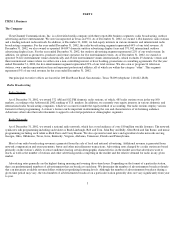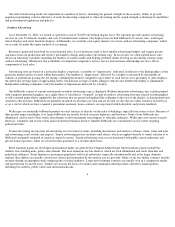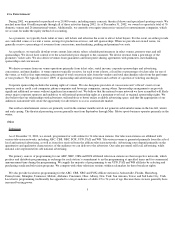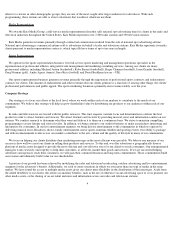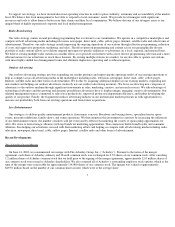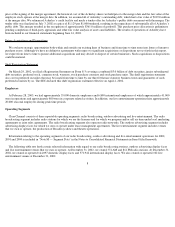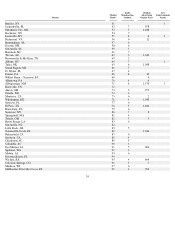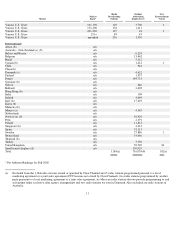iHeartMedia 2002 Annual Report Download - page 4
Download and view the complete annual report
Please find page 4 of the 2002 iHeartMedia annual report below. You can navigate through the pages in the report by either clicking on the pages listed below, or by using the keyword search tool below to find specific information within the annual report.
Our radio broadcasting results are dependent on a number of factors, including the general strength of the economy, ability to provide
popular programming, relative efficiency of radio broadcasting compared to other advertising media, signal strength, technological capabilities
and governmental regulations and policies.
Outdoor Advertising
As of December 31, 2002, we owned or operated a total of 716,039 advertising display faces. We currently provide outdoor advertising
services in over 52 domestic markets and over 65 international countries. Our display faces include billboards of various sizes, wallscapes,
transit displays and street furniture displays. Additionally, we currently own equity interests in various outdoor advertising companies, which
we account for under the equity method of accounting.
Revenue is generated from both local and national sales. Local advertisers tend to have smaller advertising budgets and require greater
assistance from our production and creative personnel to design and produce advertising copy. In local sales, we often expend more sales
efforts on educating customers regarding the benefits of outdoor media and helping potential clients develop an advertising strategy using
outdoor advertising. While price and availability are important competitive factors, service and customer relationships are also critical
components of local sales.
Advertising rates are based on a particular display’s exposure, or number of “impressions” delivered, in relation to the demographics of the
particular market and its location within that market. The number of “impressions” delivered by a display is measured by the number of
vehicles or pedestrians passing the site during a defined period and is weighted to give effect to such factors as its proximity to other displays,
the speed and viewing angle of approaching traffic, the national average of adults riding in vehicles and whether the display is illuminated.
Independent auditing companies verify the number of impressions delivered by a display.
Our billboards consist of various sized panels on which advertising copy is displayed. Bulletin and poster advertising copy is either printed
with computer-generated graphics on a single sheet of vinyl that is “wrapped” around an outdoor advertising structure, placed on lithographed
or silk-screened paper sheets supplied by the advertiser that are pasted and applied like wallpaper to the face of the display, or hand painted and
attached to the structure. Billboards are generally mounted on structures we own and are located on sites that are either owned or leased by us
or on a site for which we have acquired a permanent easement. Lease contracts are negotiated with both public and private landlords.
Wallscapes are essentially billboards painted on vinyl surfaces or directly on the sides of buildings, typically four stories or less. Because of
their greater impact and higher cost, larger billboards are usually located on major highways and freeways. Some of our billboards are
illuminated, and located at busy traffic interchanges to offer maximum visual impact to vehicular audiences. Wallscapes are located on major
freeways, commuter and tourist routes and in downtown business districts. Smaller billboards are concentrated on city streets targeting
pedestrian traffic.
Transit advertising incorporates all advertising on or in transit systems, including the interiors and exteriors of buses, trains, trams and taxis,
and advertising at rail stations and airports. Transit advertising posters includes vinyl sheets, which are applied directly to transit vehicles or to
billboards and panels mounted in station or airport locations. Transit advertising contracts are negotiated with public transit authorities and
private transit operators, either on a fixed revenue guarantee or a revenue-share basis.
Street furniture panels are developed and marketed under our global Clear Channel Adshel brand. Street furniture panels include bus
shelters, free standing units, pillars and columns. The most numerous are bus shelters, which are back illuminated and reach vehicular and
pedestrian audiences. Street furniture is growing in popularity with local authorities, especially internationally and in the larger domestic
markets. Bus shelters are usually constructed, owned and maintained by the outdoor service provider. Many of our bus shelter contracts include
revenue-sharing arrangements with a municipality or transit authority. Large street furniture contracts are usually won in a competitive tender
and last between 10 and 20 years. Tenders are won on the basis of revenues and community-related products offered to municipalities,
including bus shelters, public toilets and information kiosks.
4

